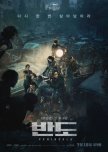Deze recentie kan spoilers bevatten
"Escape From New York" returns to the Zombie Genre
[Written/Watched 24 Dec, 2020 on Letterboxd]
Right off the bat, "Peninsula" feels like an appeal to the more action-oriented audience of the zombie genre and Western (white) audiences (with the irritating presence of white actors, calling the undead 'zombies' instead of some precious in-universe nickname, our protagonist being a military dude).
In that sense I do feel like it doesn't understand what made "Train to Busan" and "Seoul Station" so appealing to everyone back in 2016. (It wasn't the action, but how it chose to tell its story from the perspective of civilians, all while subtly criticizing South Korea's classism, privatization, and the treatment of the homeless.)
On the other, this is just director Yeon Sang-ho choosing to do something different whilst appealing to the market. "Peninsula" and the "Beyond the Thunderdome meets Resident Evil 4" vibe just feels like the inevitable fate of most zombie genre stories. And that's not a bad thing if you don't hold the zombie genre in some high esteem (especially almost twenty years since its resurgence as power genre in 2002).
And for all of that, "Peninsula" never veers into the tired and violent territory of "The Walking Dead" or other serialized zombie dramas that became parodies of themselves (because capitalism demands franchises continue beyond sustainability). The movie knows how to have fun with the genre, and revels in its silliness more than anything. (Nothing proves this more than the wild car chases where the two kids outsmart both the zombies and mad ex-military goons with some "Tokyo Drift"-level driving.)
The themes of "Busan" and even "Seoul" remain (community vs. individualism, capitalism and militarism exploiting and dehumanizing the disadvantaged), expanded to a broader, actiony scale. The humans know to work together to survive, but most still fall victim to the zombies and their own violent tendencies, wrapped up in material and military nostalgia of a world still killing itself for both.
Considering our central character really isn't given a moment to be before he's thrown into the deep-end of angst and a tragic past (a dead family, sans a brother-in-law), the film sets up the expectation of simply not expecting much from its motley crew of characters.
None of them are terrible per-se, and the film certainly tries to center their humanity above all else. But they're definitely more archetypal than the casts of "Seoul" and "Busan", who seemed determined to rise above their types and leave their audiences talking about them for days after.
Basically, more time is spent getting the characters from A-to-B than actually developing the characters so that their actions matter once the destination is reached. It doesn't earn that melodramatic Deus Ex "Resident Evil" ending (zombies respectfully maintaining their distance from the chopper as it rides off into the sunset).
Right off the bat, "Peninsula" feels like an appeal to the more action-oriented audience of the zombie genre and Western (white) audiences (with the irritating presence of white actors, calling the undead 'zombies' instead of some precious in-universe nickname, our protagonist being a military dude).
In that sense I do feel like it doesn't understand what made "Train to Busan" and "Seoul Station" so appealing to everyone back in 2016. (It wasn't the action, but how it chose to tell its story from the perspective of civilians, all while subtly criticizing South Korea's classism, privatization, and the treatment of the homeless.)
On the other, this is just director Yeon Sang-ho choosing to do something different whilst appealing to the market. "Peninsula" and the "Beyond the Thunderdome meets Resident Evil 4" vibe just feels like the inevitable fate of most zombie genre stories. And that's not a bad thing if you don't hold the zombie genre in some high esteem (especially almost twenty years since its resurgence as power genre in 2002).
And for all of that, "Peninsula" never veers into the tired and violent territory of "The Walking Dead" or other serialized zombie dramas that became parodies of themselves (because capitalism demands franchises continue beyond sustainability). The movie knows how to have fun with the genre, and revels in its silliness more than anything. (Nothing proves this more than the wild car chases where the two kids outsmart both the zombies and mad ex-military goons with some "Tokyo Drift"-level driving.)
The themes of "Busan" and even "Seoul" remain (community vs. individualism, capitalism and militarism exploiting and dehumanizing the disadvantaged), expanded to a broader, actiony scale. The humans know to work together to survive, but most still fall victim to the zombies and their own violent tendencies, wrapped up in material and military nostalgia of a world still killing itself for both.
Considering our central character really isn't given a moment to be before he's thrown into the deep-end of angst and a tragic past (a dead family, sans a brother-in-law), the film sets up the expectation of simply not expecting much from its motley crew of characters.
None of them are terrible per-se, and the film certainly tries to center their humanity above all else. But they're definitely more archetypal than the casts of "Seoul" and "Busan", who seemed determined to rise above their types and leave their audiences talking about them for days after.
Basically, more time is spent getting the characters from A-to-B than actually developing the characters so that their actions matter once the destination is reached. It doesn't earn that melodramatic Deus Ex "Resident Evil" ending (zombies respectfully maintaining their distance from the chopper as it rides off into the sunset).
Vond je deze recentie nuttig?











